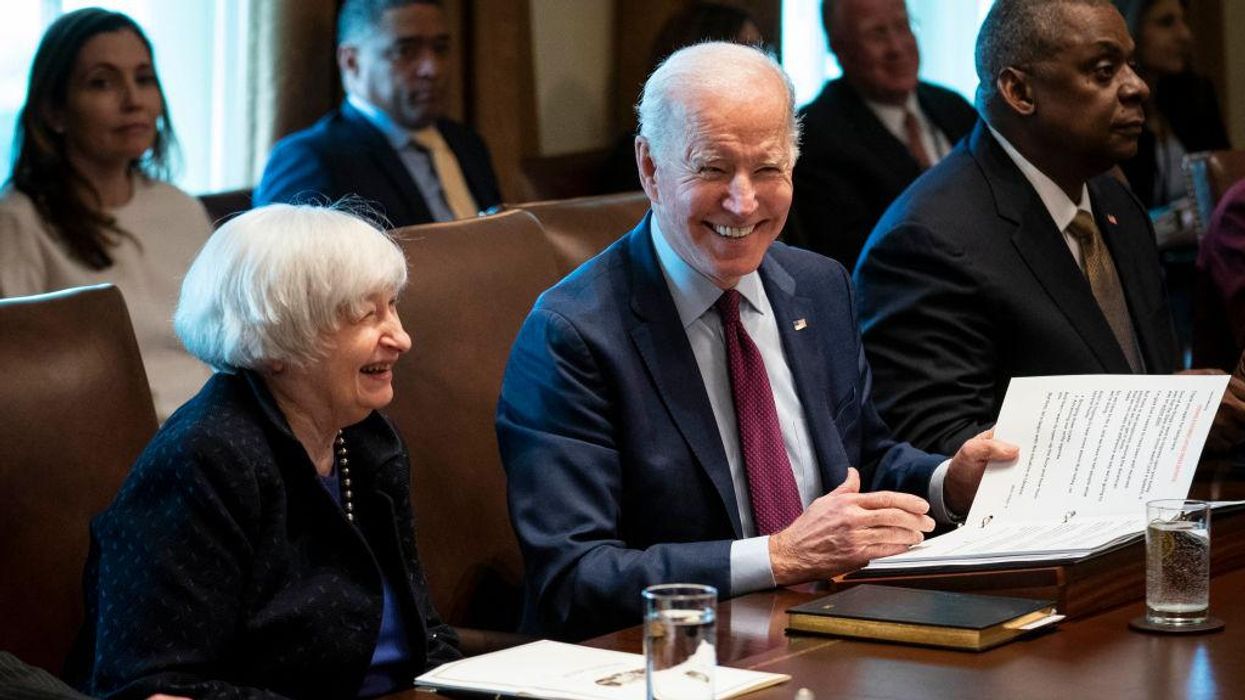
Photo by Sarah Silbiger for The Washington Post via Getty Images

Recent estimates, both from members of the U.S. Congressional Joint Economic Committee and from NerdWallet, indicated that the average American household may have to spend $11,500 just to maintain the same standard of living as in previous years.
The price of eggs last month was up 39.8% over August 2021; gasoline was up 25.8%; health insurance, 24.3%; groceries, 13.5%; and plane tickets, 33.4%. Although the 10.8% drop in gas prices in August reportedly slowed U.S. inflation, these and most other prices have continued to climb.
Consumer inflation over 2021 was, as of last week, 8.3%.
The U.S. Congressional Joint Economic Committee Republicans published their state inflation tracker results in late August, indicating both the annualized inflation cost per household and price increases since January 2021, when President Joe Biden took office.
In New York, the annual cost per household is $8,483. In California it's $9,476; in Colorado, $11,438; in Texas $8,915; in Florida, $9,318; in Arizona, $10,167.
Prices increased 13.3% from January 2021 to July 2022, reflected in an additional monthly cost of $717 for the average American family. The report noted that even "if prices stop increasing altogether, the inflation that has already occurred will cost the average American household $8,607 over the next 12 months."
Using inflation and annual spending data from the U.S. Bureau of Labor Statistics, NerdWallet determined household expenditures may rise by $11,500.
American families spent, on average, $61,300 in 2020. This year, the exact same purchases (e.g., food, gas, and clothing) will run upwards of $72,900 owing to inflation.
On a monthly basis, this increase would amount to an additional cost to families of $961: +$101 for groceries; +$120 for shelter; +$70 for household utilities; and +$209 for gasoline.
The impact of this increase will be more significantly felt by those who earn less.
Republicans have attributed much of the inflation now sapping Americans' savings to Biden's $1.9 trillion stimulus package.
Sen. Mike Braun (R-Ind.) noted that the Biden administration first denied the existence of inflation, then argued it was transitory, and has now determined to get it under control, all while continuing to exacerbate the underlying cause by spending.
\u201cFirst they said inflation didn't exist. And they kept spending.\n\nThen they said it was transitory. And they kept spending.\n\nLast night, President Biden said he's going to "get control over inflation." \n\nAnd he keeps spending.\u201d— Senator Mike Braun (@Senator Mike Braun) 1663610514
Sen. Marsha Blackburn (T-Tenn.) wrote on Tuesday: "Month after month we've seen record high inflation as a direct result of Biden's reckless spending on progressive programs. The coming months will be no different."
Former Secretary of State Mike Pompeo noted, "President Biden wanted to declare victory on inflation without solving the problem. One thing is clear: spending trillions that we don't have is making this worse."
"So if you look what Biden has done, he comes into office, and what does he do? He goes on this massive spending and borrowing and printing spree, trillions and trillions of dollars," said Florida Gov. Ron DeSantis last week. "And he was warned ... that if you do this, you are going to spark a major inflation. And not only was he hell-bent on doing that, he also attacked American energy production. So you're inflating the currency, and you're cutting down on production. Of course, you're going to get inflation."
The Federal Reserve Bank of San Francisco corroborated this claim, suggesting that U.S. inflation is higher than in other countries at least in part due to Biden's spending. A March FRBSF publication indicated: "Estimates suggest that fiscal support measures designed to counteract the severity of the pandemic's economic effect may have contributed to this divergence by raising inflation about 3 percentage points by the end of 2021."
Jonathan Parker, an economist at MIT, spoke to the Brookings Institution about Biden's stimulus spending, stating "a better-targeted policy could have been more efficient in that it could have provided more pandemic insurance at lower cost and without as much excess demand later." Excess demand results in inflation.
In June, Biden blamed House Republicans for inflation. He suggested that Republicans' opposition to his Build Back Better social-spending bill, which the Congressional Budget Office projected would cost $4.5 trillion in new government spending, had stopped his "plans to bring down costs on ordinary families."
At an August 26 economic conference, Jerome Powell, chairman of the Federal Reserve, suggested that the Fed would continue raising interest rates in hopes of ensuring price increases will not become permanent. The rate hikes are intended to slow the economy and quell demand, although they may also plunge the U.S. into a recession and put millions of Americans out of work.
Today, the Federal Reserve is once again meeting and is expected to raise its key short-term rate by three-quarters of a point for the third consecutive time. This would effectively bring its benchmark rate to its highest level in nearly 15 years, within a range of 3% to 3.25%.
Just as high prices are adversely impacting consumers, so too will the rate hikes, as consumer and business loans will be affected.
The question that many observers hope to have answered by Powell today: Will the Fed moderate its rate hikes in the near future or continue to tighten credit in an effort to tamp down inflation?
Some economists forecast that the key rate could reach 4% before January 2023 and that there will be another round of hikes next year, reaching upwards of 4.5%.
Notwithstanding Powell's and other Fed officials' intimation that they seek a "soft landing," rates at these levels might mean America will land in a recession.
Concerning efforts to avoid recession, the former president of the Federal Reserve Bank of New York, William Dudley, suggested, "The problem is that the room to do that is virtually non-existent at this point."
Oxford economist Kathy Bostjancic stated, "It's going to end up being a hard landing."